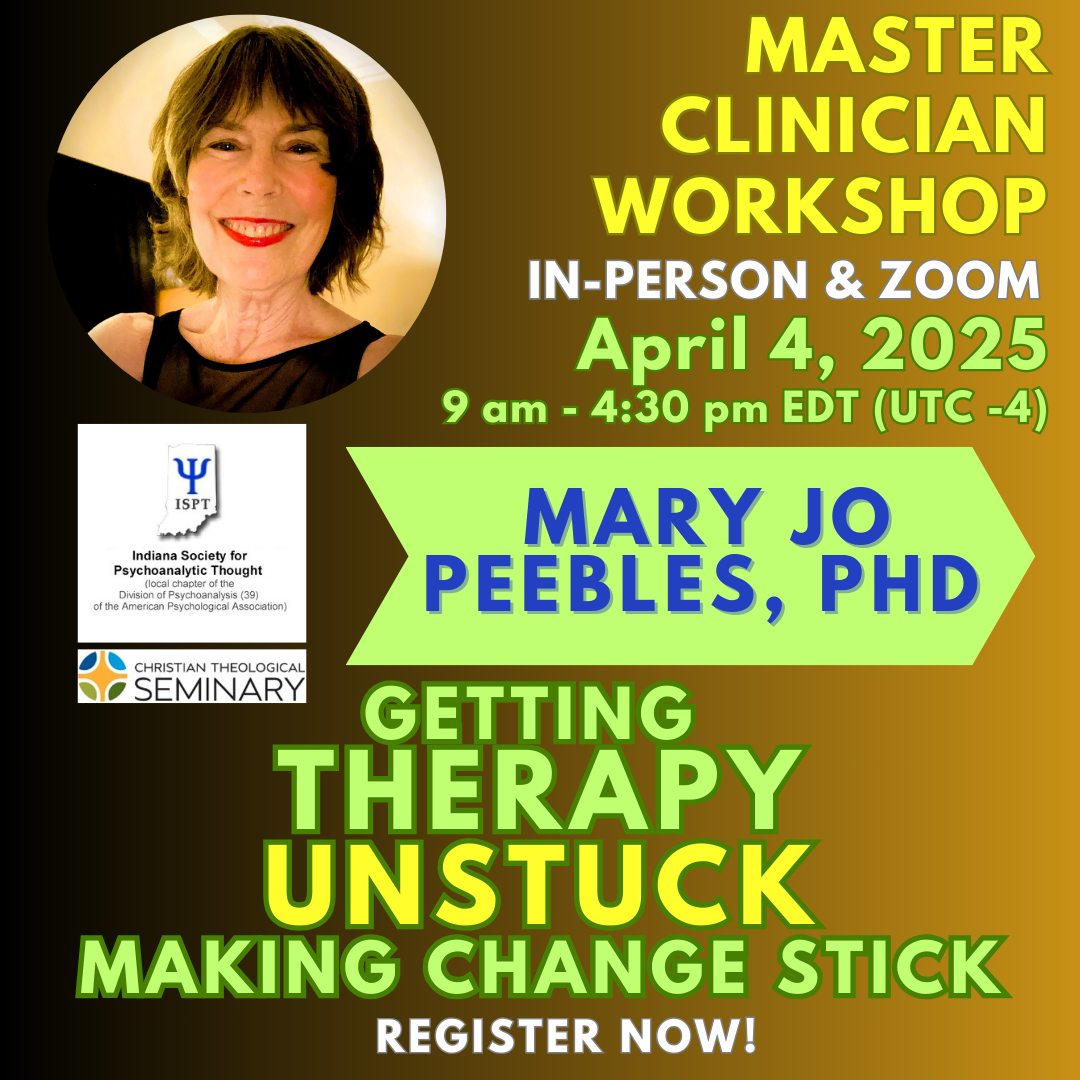REGISTRATION IS NOW CLOSED!
Register at the form below.
2025 ISPT Peebles Master Clinician Workshop
April 4, 2025

with
Dr. Mary Jo Peebles
Getting Therapy Unstuck,
Helping Change Stick
9 am – 4:30 pm EDT (UTC/GMT -4)
In-Person and Zoom Live Stream
(5.5 CEs)
Workshop Description
Feeling stuck in psychotherapy may be universal, but when we encounter it on our watch, we feel ashamed. Too often we blame ourselves or blame the patient. This workshop focuses on interrupting cycles of blame and instead embracing stuckplaces as goldmines for growth.
Once we feel less stuck, how then do we help our patient’s change stick? We look at four skills key to lasting change: clear focus, right-hemispheric communication, making sure the work is being absorbed, and actively facilitating internalization. Through mistake-sharing, slides, clinical examples, and roleplays with the presenter, we bring concepts to life. By the end of the afternoon, therapists may notice feeling invigorated, curious, and open to how stuck may be exactly the turning point they want their work to experience.
Presenter
Mary Jo Peebles, PhD, ABPP, ABPH did her undergraduate work in Psychology at Wellesley College and received her PhD in Clinical Psychology from Case Western Reserve University. She completed Postdoctoral Fellowships in Child and Adolescent Psychology at the University of Texas Medical Branch in Galveston Texas and in Adult Psychology at the Menninger Clinic in Topeka Kansas. She worked at Menninger nearly two decades, practicing, teaching, and supervising in the Psychology Postdoctoral Fellowship Program and the Karl Menninger School of Psychiatry. Dr. Peebles is a graduate of the Topeka Institute of Psychoanalysis, a past member of the American Psychoanalytic Association, has trained in family systems therapy, biofeedback and EMDR, is Board Certified in Clinical Psychology and Clinical Hypnosis, and worked as a member of the Medical Staff at Chestnut Lodge Hospital. She has given workshops and presentations nationally and internationally on trauma, therapy planning, and psychological testing; has authored numerous articles, book chapters, and books; and has won numerous awards for both her teaching and writing. Her most recent book, When Psychotherapy Feels Stuck, was published by Taylor & Francis in 2021. With over 50 years of direct clinical experience, Dr. Peebles resides now in Beacon, NY, writing, teaching, and consulting, in person or remotely, with individuals and groups.
Schedule
(all times in EDT [UTC/GMT -4])
9:00-10:30 am Session 1 (1.5 hrs.): Shifting our Mindset about Being Stuck & Developing Shared Focus
10:30-10:45 am Break
10:45 am – 12:00 pm Session 2 (1.25 hrs.): Balancing Left and Right Hemispheric Processing
12:00-1:30 pm Lunch
1:30-3:00 pm Session 3 (1.5 hrs.): Absorbing and Internalizing–the Art of Taking Things In
3:00-3:15 pm Break
3:15-4:30 pm Session 4 (1.25 hrs.): Learning to Not-Know
Fee*
Early Bird rate through March 15. Standard rate begins March 16 (registration closes April 2):
Regular Non-Member: Early Bird $ 149, Standard $ 169
Regular ISPT Member: Early Bird $ 129, Standard $ 149
Student Non-Member: Early Bird $ 89, Standard $ 109
Student ISPT Member: Early Bird $ 79, Standard $ 99
*Fees are non-refundable after March 15.
Learning Objectives
1. Changing Mindset—Explain the shift in attitude from being stuck, to feeling stuck, to understanding that stuck is exactly where one wants to be for change to happen
2. Focus— Describe two reasons why developing and maintaining a shared therapeutic focus is essential.
3. Right hemisphere processing—List two ways to engage a patient through a right-hemispheric processing mode.
4. Absorbing and Internalizing—Demonstrate three interventions for deepening a patient’s absorption and two interventions for promoting internalization.
5. Learning to not-know— Discuss the concept of notknowing as it applies in the clinical situation.
Sources
Peebles, M. J. (2021). When psychotherapy feels stuck. Routledge.
Bordin, E.S. (1979). The generalizability of the psychoanalytic concept of the working alliance. Psychotherapy: Theory, research and practice, 16(3), 252–260.
McGilchrist, I. (2009). The master and his emissary. New Haven, CT: Yale University Press.
Vaughan, S. C. (1997). The talking cure: Why traditional talking therapy offers a better chance for long-term relief than any drug. New York, NY: Henry Holt and Company.
Frenkel-Brunswik E. (1949). Intolerance of ambiguity as an emotional and perceptual personality variable. Journal of Personality, 18(1), 108–143.
Policies
It is the policy of the Society to encourage multidisciplinary learning. This Master Clinician Day Workshop is appropriate for the intermediate level of knowledge in the area of psychoanalysis. Enrollment is intended for psychologists and other mental health practitioners, graduate students and all who are interested in psychoanalysis.
Continuing Education
This program is offered for 5.5 continuing education credits. The entire meeting must be attended in order for attendees to receive certificates. Upon completion of an evaluation form, a certificate will be provided. This serves as documentation of attendance for all participants. Psychologists will have their participation registered through Division 39.
Division 39 is approved by the American Psychological Association to sponsor continuing education for psychologists. Division 39 maintains responsibility for this program and its content.
Division 39 is committed to accessibility and non-discrimination in its continuing education activities. Division 39 is also committed to APA Ethical Guidelines. Participants are asked to be aware of the need for privacy and confidentiality throughout the program. If program content becomes stressful, participants are encouraged to process these feelings during discussion periods. If participants have special needs, we will attempt to accommodate them.
